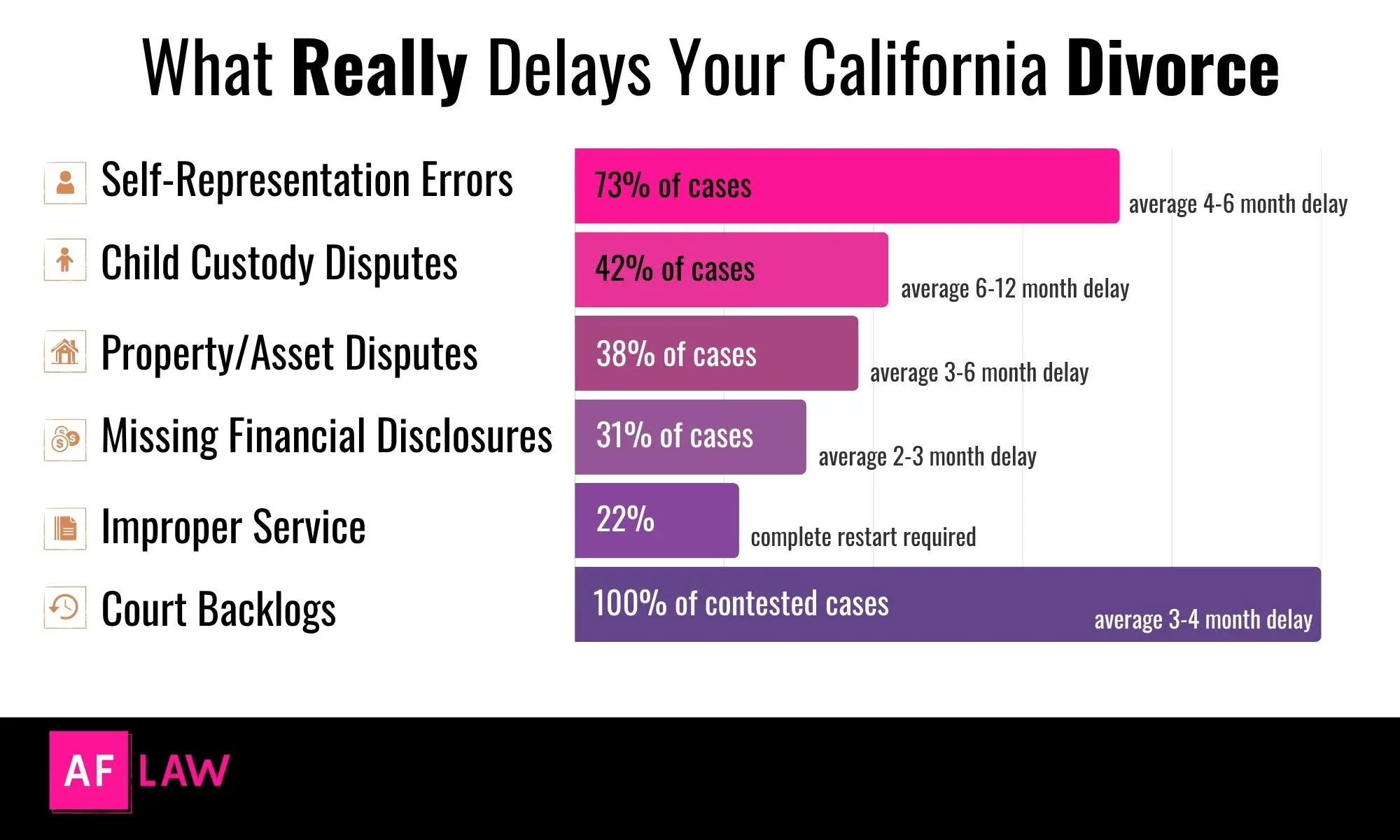California mandates a six-month and one day waiting period to finalize a divorce, but for some Sacramento couples, it could take 15 months or more to be free. This gap between legal minimum and practical reality costs families thousands in extended legal fees and prolonged uncertainty. Your timeline depends on three critical factors: agreement level with your spouse, complexity of assets, any custody issues with children, and Sacramento County's current court backlog.
Working with an experienced Sacramento divorce attorney eliminates procedural delays that unnecessarily stretch cases. While the mandatory waiting period stays fixed, strategic filing and negotiation compress everything else. This guide explains California's legal requirements, Sacramento-specific court dynamics, and proven strategies to finalize your divorce efficiently.
California's Mandatory Six-Month Waiting Period Explained
California Family Code § 2339 establishes an absolute minimum: no divorce is final before six months and one day pass from the service date. This countdown starts when your other spouse receives divorce papers, not when you file the divorce petition. Many Sacramento residents mistakenly believe that the date of filing triggers the 6-month clock, then lose weeks waiting for proper service.
The waiting period serves dual purposes in the no-fault divorce state. Courts frame it as reconciliation time, though modern practice treats it as administrative processing. During these six months, you can:
- File temporary orders for support and custody.
- Complete mandatory financial disclosures.
- Negotiate settlement agreements.
- Obtain property restraining orders.
- Prepare final judgment documents.
Residency Requirements Before Filing
California requires that at least one spouse must establish:
- 6 months of California residency
- 3 months of county residency
These requirements run separately from the divorce waiting period. For example, if Texas residents move to Sacramento, they have to wait six months for California residency, then another six months minimum after filing and serving the divorce petition, with a total timeline of 12 months for an uncontested divorce in that instance.
Why Most California Divorces Take 15 Months, Not 6

According to Martindale-Nolo Research's 2019 divorce studies, contested divorces in California take at least 18 months to finalize. The data confirms that complex contested cases, particularly those involving custody disputes or significant assets, routinely extend beyond two years. This delay is also impacted by the challenges faced by self-represented litigants (SRLs), who, according to the Judicial Council of California, experience higher rates of document rejections, improper service, and procedural errors.
The Contested vs. Uncontested Reality Gap
- Uncontested divorce (6-8 months): Both parties agree on all divorce terms before filing, including custody agreements and the settlement agreement.
- Contested divorce (12-18 months): Any disagreement between spouses over shared property or asset division triggers a contested status:
- Child custody disputes add 6-12 months
- Property division conflicts add 3-6 months
- Business valuations extend timeline 3-6 months
- Spousal support disputes add 2-4 months
- Default divorce (8-10 months): Spouse doesn't respond within 30 days per California Code of Civil Procedure § 585. Courts scrutinize defaults involving children or significant assets.
California Court Backlogs Add Months
Sacramento Superior Court's family law departments handle overwhelming caseloads, creating systematic delays. The court system processes thousands of family law cases annually, handling many divorces with limited judicial resources.
The court's mandatory mediation requirement for custody disputes through Family Court Services adds 2-3 months minimum. Appointments are booked weeks ahead. Reports take additional weeks. Contested recommendations require follow-up hearings, adding more months. While mediation helps many families, the scheduling reality extends timelines significantly.
Administrative factors often contribute to delays in the divorce process. Some common administrative setbacks include:
- Incorrect paperwork rejection: 30-60 days per error.
- Missing financial disclosures: 2-3 month continuances.
- Improper service: Complete restart of the six-month period.
- Self-represented filing errors: Multiple resubmissions over 3-4 months.

Child Custody Disputes: The Timeline Killer
Child-related conflicts involving children and divorcing couples extend the divorce process and the entire process more than any other factor. California's "best interests of the child" standard requires extensive evidence gathering and evaluation. Sacramento judges order comprehensive assessments before making custody determinations, particularly in high-conflict cases.
Mandatory Mediation Timeline
- Initial appointment: 4-6 weeks from referral
- Mediation report: 2-3 weeks after sessions
- Failed mediation leading to contested hearings: 3-4 months later
- Total mediation process: Minimum 4-6 months
Emergency custody orders can also create delays. Although courts can issue temporary orders within 24-72 hours for immediate danger, this often leads to months of follow-up hearings to establish permanent orders, which can extend cases beyond two years.
Financial Complexity and Delays
High-asset divorces are particularly prone to delays, especially when they involve:
- Business valuations: Takes 3-6 months due to separate experts, competing appraisals, and potential judicial intervention.
- Property characterization disputes: Requires tracing transactions and forensic accounting for mixed assets.
- Post-judgment requirements:
- QDRO preparation: 2-4 months after finalization.
- Real property sales in down markets: 6-12 months.
- Debt allocation disputes: 2-3 months for forensic analysis.

Summary Dissolution: California's Fast Track Option
California offers summary dissolution under Family Code § 2400 for marriages meeting strict criteria. This administrative process eliminates court appearances and guarantees a six-month finalization for qualifying couples.
Strict Requirements Few Couples Meet
Summary dissolution eligibility requires:
- Marriage duration under five years
- No minor children together
- No real property ownership
- Community property valued under $50,000 (excluding vehicles)
- Separate property valued under $50,000 per spouse
- Community debt under $7,000 (excluding vehicle loans)
- Written agreement dividing assets and debts
- Both spouses are waiving spousal support permanently
These restrictions eliminate most Sacramento divorces from qualification. The five-year marriage limit alone disqualifies many otherwise simple cases. The property and debt limits exclude homeowners and most dual-income couples. However, qualifying couples file jointly and finalize exactly six months later without judicial review.

Timeline Acceleration Strategies
Strategic decisions compress divorce timelines significantly despite fixed legal requirements. Proper planning and professional guidance eliminate months of unnecessary delays common in self-represented cases.
File First, Negotiate Second
Immediate filing upon deciding to divorce starts the mandatory waiting period, while preserving negotiation flexibility. But delaying filing while attempting to negotiate an agreement wastes valuable time. The six-month clock only starts with proper service, not informal separation or negotiation of the outstanding issues.
Professional process servers ensure valid service for $75-$150, guaranteeing the commencement of the countdown. Personal service creates indisputable start dates. Substituted service or publication adds weeks of additional requirements before the waiting period begins.
Document preparation should front-load to avoid final-stage delays:
- Complete financial disclosures within 30 days, not the allowed 60 days.
- Prepare settlement agreements by month three.
- Submit proposed judgments by month five.
- Allow correction time before the six-month mark.
Mediation Beats Litigation Every Time
Private mediation costs $3,000 to $8,000 total versus $15,000 to over $50,000 for contested litigation. Sacramento mediators schedule within 2 to 3 weeks, in contrast to 6 to 12 months for trial dates. Mediation sessions produce comprehensive agreements in days, not months of litigation. Mediated agreements rarely face court rejection, unlike contested judgments requiring multiple revisions.
Mediator selection affects timeline efficiency. Former judges understand local court preferences. Financial specialists resolve complex property issues faster. Child development experts craft workable custody arrangements. Specialized expertise prevents impasse on technical issues.
Preparation maximizes mediation productivity. Organize all financial documents before sessions. Calculate support using the California Guideline Calculator. Propose realistic custody schedules based on work commitments. Enter mediation ready to resolve, not explore.
Realistic Timeline Expectations by Case Type
Different divorce types follow predictable timeline patterns in Sacramento County based on court data and attorney experience.
Sacramento Superior Court's specific procedures affect these timelines. Department assignments determine case management style. Some departments expedite stipulated agreements, others scrutinize every detail. Electronic filing accelerates processing, but technical errors cause immediate rejection.
Act Before Delays Compound
I've handled hundreds of Sacramento divorces over the past 10+ years and know exactly which issues trigger delays. My strategic approach compresses timelines while protecting your interests. AF Law Firm transforms the divorce process from extended litigation into an efficient resolution. Contact me today to start your six-month countdown strategically.


%205.avif)



